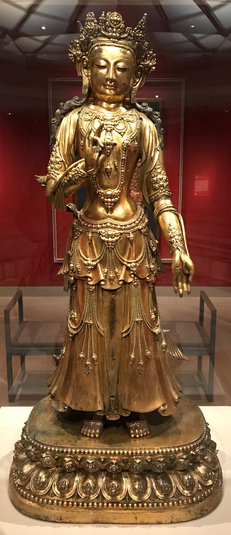
Item: Bodhisattva - (Male, Standing)
| Origin Location | China |
|---|---|
| Date Range | 1400 - 1499 |
| Lineages | Gelug and Buddhist |
| Material | Metal, Mercuric Gild |
| Collection | Private |
Classification: Deity
Appearance: Peaceful
Gender: Male
Bodhisattva Figure: very likely from a set of two that accompany a central Buddha sculpture, or, from a set of the Eight Great Bodhisattvas which also would have either Shakyamuni or Amitabha as the central subject of the set.
This figure is unidentified. There is no inscription on the base which which would identify the figure and there are no recognizable attributes that are unique to a specific bodhisattva such as Lokeshvara, Manjushri or Maitreya.
In Himalayan figurative art there are eleven different appearances, or figurative forms. Male and female bodhisattvas have Peaceful Appearance. The terms bodhisattva appearance, peaceful appearance, deva appearance and sambhogakaya appearance are all synonymous and refer to both male and female peaceful figures. The term bodhisattva has two meanings, an [1] abstract Buddhist meaning and [2] a descriptive art meaning. The art meaning refers to appearance only and not to the abstract function category of the figurative subject. Peaceful subjects can have more than one face and two arms however the ornaments and manner of dress is consistent and uniform with all peaceful figures.
Thirteen Peaceful Ornaments:
- Five Silken Garments - Eight Jewel Ornaments
Five Silken Garments: - Blue Silk scarf - Five-coloured Crown Pendants - White Upper Garment - Lower Skirt Garment - Sleeves (or Long Scarf) for Dancing
Eight Jewel Ornaments: - Crown - Earrings - Choker Necklace - Armlets - Middle Length Necklace - Long Necklace - Bracelets - Anklets
There are of course different lists and different ways to enumerate the Thirteen Ornaments. Sometimes a belt and girdle are listed.
Jeff Watt 3-2019
Druout, Paris, 1904.
Exhibition: Faith & Empire - Art & Politics in Tibetan Buddhism
Thematic Sets
Sculpture: Yongle Style, Xuande & Zhengtong Period
Buddhist Figure: Bodhisattva Main Page
Sculpture: Bodhisattva Figures (Unidentified Sculpture)
Subject: Eight Great Bodhisattvas (Main Page)
Collection of Drouot (1904)
Sculpture: Yongle Style (Unidentified Subject)
Sculpture: Yongle & Xuande Style (Masterworks)
Buddhist Figure: Bodhisattva Art Definition

